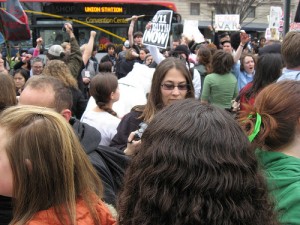“The success of American diplomacy in the next decade will be measured in no small part by its ability to connect with the hundreds of millions of people throughout the world whose identity is defined by religion.”
—From “Engaging Religious Communities Abroad: A New Imperative for U.S. Foreign Policy,” The Chicago Council on Global Affairs.
The United States was a multi-cultural society from its beginning. The first Jewish congregation is dated to the colonial period, in Rhode Island, in the mid 1600’s.
Maryland was founded as a colony for Catholics, while many of the New England settlements were begun by Reformed Protestants. Baptists headed to the freedom of Rhode Island. Some of the country’s founding fathers were deists and even agnostics. Later, atheists and Muslims, Hindus and Orthodox Christians and countless others joined the religious mix.
Our ancestors left behind the world of established religions, countries whose identities were bound up in a particular religion, places where one might be persecuted for different beliefs. They left behind the wars of religion which so devastated Europe in the sixteenth and seventeenth centuries. Eventually, Middle Eastern immigrants left countries where Crusaders had fought Turks and other Islamist believers, as well as Jews.
We began a nation where the First Amendment to our constitution allowed for a religious freedom unknown in the old countries.
The countries they left are still there, and many of them consider religion a part of their national identity. Rightfully, we urge them to protect minorities. However, we should refrain from a feeling of superiority. Critics suggest our tolerance risks becoming antagonism toward any religion. Tolerance differs from denigration. If we denigrate religion, we will have a hard time working in a world where the majority find comfort and guidance from it.


 Protests suggest an us-against-them confrontation that risks the protest turning into a riot or, at best, toward hardening of hearts on both sides.
Protests suggest an us-against-them confrontation that risks the protest turning into a riot or, at best, toward hardening of hearts on both sides. I prefer writing: opinion pieces, articles, and blogs, for example, print or digital, to protesting. Even more, I like personal conversation between two or a few people. Talking together can be risky, too, of course. People may end up shouting at each other and walking away in anger.
I prefer writing: opinion pieces, articles, and blogs, for example, print or digital, to protesting. Even more, I like personal conversation between two or a few people. Talking together can be risky, too, of course. People may end up shouting at each other and walking away in anger.